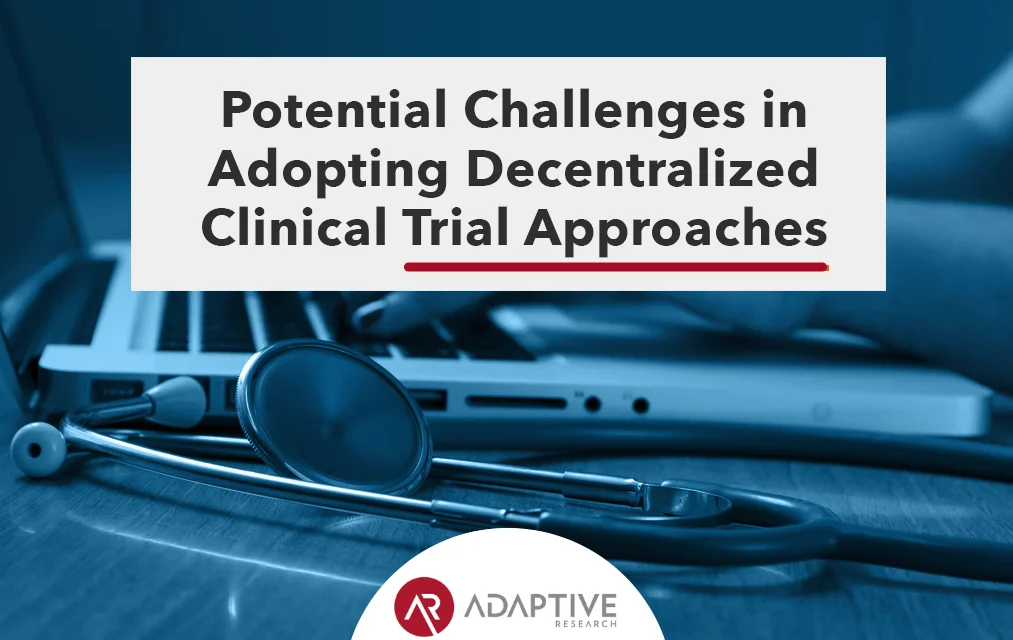Clinical trials by their very nature are very complex. They are lengthy, costly, and often difficult to access. That makes the field ripe for real-world application, and by most accounts, decentralized clinical trials are the most promising way to implement them.
But challenges remain, especially when considering how to best implement them in the medical industry. The potential of decentralization is significant, but it can be difficult to implement. Organizations must decide on the best way to use this approach and how to implement the technology without overextending budgets.
The bottom line is that the current research model is flawed, but decentralized clinical trials are not necessarily the perfect solution. Let’s explore these challenges and some solutions a little further.
Challenge #1: Collecting Patient Data
One of the major benefits of decentralized clinical trials is that they allow for a wider range of participation, as long as patients have appropriate access to the internet. In fact, this new model will likely be able to reach more people than traditional models due to its ease of use. However, it must be considered that not everyone has access to the internet. A decentralized clinical trial that cannot reach these populations will not be very effective at all. This is especially important in developing regions of the world where internet access might be more limited.
It will also be important to consider how patient data are handled. Each person’s medical history can provide valuable insight into the efficacy of a new drug or treatment. If this data is stored on a centralized server or database, it could be exploited by hackers or governments. New technology must be developed to prevent the loss of this important data and keep it secure.
Challenge #2: Refinement of Data
Decentralized trials present unique challenges related to patient safety including the ability to ensure proper screening, compliance with regulations surrounding informed consent, and protection of participants’ privacy. Ensuring that participants understand their rights and risks before joining the trial is often more difficult to do, especially if patient information needs to be sent back to another location for data analysis. This remoteness could also lead to difficulties with monitoring participants.
For example, decentralized trials rely heavily on participant self-reporting, which can introduce inaccuracies into the final dataset. This problem is exacerbated by the potential for participants to interact with each other outside of trial-sanctioned communications, a concern many researchers cite as a major reason for using a centralized system.
As a solution for protecting data, blockchain is being explored as a means of maintaining electronic health records. Blockchain provides a decentralized, trustless system that securely stores data across multiple nodes and provides an immutable set of transactions recorded from the genesis block to the present day. In addition, blockchain is built with cryptographic hashing which allows for patients’ identities to be cryptographically hidden.
Blockchain’s features would help ensure the anonymity of patients’ data. Using the technology, personal health records could be kept in sync across multiple providers and EHRs without the need for a centralized system or intermediary. Blockchain would provide a secure network that can store encrypted patient health information while still allowing authorized individuals to view specific subsets of the information when needed.
The following are some potential benefits of using blockchain technology in clinical trials:
- Streamlined patient recruitment and payment processing due to the ability to track/verify patients’ information on a public ledger.
- Data integrity is ensured since it can be tracked on an open ledger.
- High transaction throughput due to the open ledger. This allows more opportunities for data collection, quicker dissemination of trial results, and potentially reduced total cost of trials.
- Minimal third-party involvement in validating transactions prior to execution due to decentralization of the system.
Challenge #3: Cost of Implementation
There are many resources required for the success of a decentralized clinical trial. There needs to be ample communication between participants, doctors, nurses, researchers, and pharmacists. The study must also have an adequate budget. Participant incentives may be necessary in some cases too. These costs can add up quickly, especially when they are not factored into a study’s budget. It may be impossible to make up for a lack of funding after the trial has already begun, and thus interfere with its ability to complete all necessary testing. If a decentralized clinical trial cannot afford to implement these components, it will not be effective or thorough enough to produce reliable results that can be used in medical practice.
Challenge #4: Technology Access
Decentralized clinical trials also pose a number of challenges for participants. For example, some decentralized clinical trials collect data through mobile devices and require daily involved tasks such as swabbing objects, taking photographs, and sending information back to the home-based lab for analysis. This can be problematic if participants do not have ready access to mobile devices or the internet. To address these challenges, decentralized clinical trials require participants to be educated about the process and its requirements.
Conclusion
All these challenges can be overcome and decentralized approaches still have a number of theoretical and practical advantages over their centralized counterparts. The decentralized approach fits well with the interests of many stakeholders, including patients, physicians, payers, and regulators.
A decentralized system would also allow trials to proceed more rapidly than they would with a centralized model since they would not require as many approvals from institutional review boards, ethics committees, or data safety monitoring boards. In addition to these practical concerns about the adoption of decentralized approaches, there are theoretical concerns that need to be addressed before a decentralized approach can become widely adopted.
Need assistance navigating your decentralized trial? Adaptive Research has experience in regulatory, clinical, data management, and commercial aspects of decentralized trials. Learn more here.






